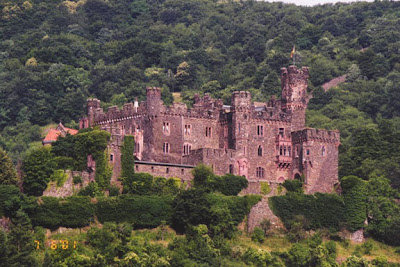
German history, as the rest of Western history, gets very dynamic from about the 12th century onward.
Why is that? Did people just become less heads-down toilers in the field, less rapacious barbarian warriors, just transform themselves into civil societies progressing inevitably towards our modern civilization? Weren't they before?
Plague, war, floods, threats from without and within. All of these occurred though the periods 11th century through 16th. But they had before as well. Over thirty percent of the population of Europe was wiped out, multiple times - from plague alone. Great fields were taken, not as farm land, but to dispose of the dead.
Why is this period then considered historically grounding? From whence did the great masters - in literature, art, music, science, philosophy, invention, medicine - come?
Part of the answer, as with other things, lies in our own perceptions. We perceive this period dynamic simply because we know more about this period. Written histories have proven more durable than oral and balladic histories. (When was the last time you had to memorize a 50 stanza ballad dealing with Norse conquest?) Written histories are how we know what we know of ancient Egypt, Greece and Rome, but many other cultures didn’t adopt such arcane methods as the written word.
Therein lies part of the answer. In Mainz, just southwest of Frankfurt Germany, the son of a goldsmith invented a way to reproduce the printed word quickly and inexpensively. Printing presses had been around for a bit (mostly for carved wooden block art – “prints”,) as had type. Johann Gutenberg invented, built, and used a means of making type and setting it in blocks for printing (in presses) that allowed the type to be set, used, and then reset for new content. For the first time, mass production of multiple printed works could be realistically undertaken. Of course, first was the Gutenberg Bible. Books could be reproduced and owned by far more than the few.
I’ll leave it you, gentle reader: is the explosion of ideas that followed because of the press, or was the appearance of the press merely the release of a dam previously impeding the free flow of ideas?
Certainly we know a great deal about the years following, and the century or two before – simply because there were presses to print what people still remembered, and the events as they occurred.
Simultaneously, the Medici in Florence were patrons to the arts in ways that were freer from the Church and later became known as the enlightenment. Whether causative, and enabled by the later invention of the press – or not, clearly a revolt from a single orthodoxy or narrative, to a multiplicity of ideologies livened politics, art, science and religion. The Renaissance was well underway.
Why is that? Did people just become less heads-down toilers in the field, less rapacious barbarian warriors, just transform themselves into civil societies progressing inevitably towards our modern civilization? Weren't they before?
Plague, war, floods, threats from without and within. All of these occurred though the periods 11th century through 16th. But they had before as well. Over thirty percent of the population of Europe was wiped out, multiple times - from plague alone. Great fields were taken, not as farm land, but to dispose of the dead.
Why is this period then considered historically grounding? From whence did the great masters - in literature, art, music, science, philosophy, invention, medicine - come?
Part of the answer, as with other things, lies in our own perceptions. We perceive this period dynamic simply because we know more about this period. Written histories have proven more durable than oral and balladic histories. (When was the last time you had to memorize a 50 stanza ballad dealing with Norse conquest?) Written histories are how we know what we know of ancient Egypt, Greece and Rome, but many other cultures didn’t adopt such arcane methods as the written word.
Therein lies part of the answer. In Mainz, just southwest of Frankfurt Germany, the son of a goldsmith invented a way to reproduce the printed word quickly and inexpensively. Printing presses had been around for a bit (mostly for carved wooden block art – “prints”,) as had type. Johann Gutenberg invented, built, and used a means of making type and setting it in blocks for printing (in presses) that allowed the type to be set, used, and then reset for new content. For the first time, mass production of multiple printed works could be realistically undertaken. Of course, first was the Gutenberg Bible. Books could be reproduced and owned by far more than the few.
I’ll leave it you, gentle reader: is the explosion of ideas that followed because of the press, or was the appearance of the press merely the release of a dam previously impeding the free flow of ideas?
Certainly we know a great deal about the years following, and the century or two before – simply because there were presses to print what people still remembered, and the events as they occurred.
Simultaneously, the Medici in Florence were patrons to the arts in ways that were freer from the Church and later became known as the enlightenment. Whether causative, and enabled by the later invention of the press – or not, clearly a revolt from a single orthodoxy or narrative, to a multiplicity of ideologies livened politics, art, science and religion. The Renaissance was well underway.
2 comments:
Where's the beer?
Most of the monasteries, where beer and liquors were made, were built in this period. Andechs, Weltenburg both date from this time.
Post a Comment